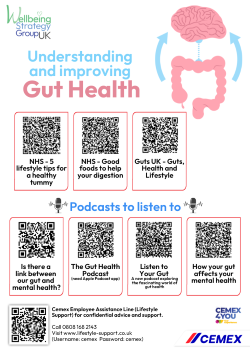Gut health is a crucial aspect of overall well-being, yet it often doesn’t receive the attention it deserves. In the UK, digestive disorders significantly impact the quality of life for many individuals, accounting for over 10% of GP consultations in the UK. Understanding how to maintain a healthy gut can lead to better health outcomes and improved daily life.
What affects our gut health?
Our brains have a direct effect on the stomach and intestines. For example, the very thought of eating can release the stomach’s juices before food gets there. This connection goes both ways. A troubled intestine can send signals to the brain, just as a troubled brain can send signals to the gut. Therefore, our stomach or intestinal distress can be the cause or the product of anxiety, stress, or depression. That’s because the brain and the gastrointestinal (GI) system are intimately connected.
Stress can cause stomach problems and change the levels of bacteria in the gut. This is because stress can elevate stress hormones, cause inflammation, and change the way the body functions. In turn, this can cause your gut bacteria to release metabolites, toxins, and neurohormones that can cause changes to the way you eat and affect your mood.
Other factors affecting our gut
Lack of sleep
A lack of sleep can not only cause stress, leading to the aforementioned symptoms and elevated cortisol levels but it can also impact your food choices and when you choose to eat. When tired you are more likely to eat processed foods that are higher in carbohydrates, sugars and trans fats, all of which can contribute to reduced gut health.
A highly processed diet
Highly processed foods tend to be higher in carbohydrates, refined sugars and trans fats, and include less fibre than fresh produce. Eating processed foods on a daily basis can lead to dysbiosis, which can affect your health and wellbeing.
Taking antibiotics
Antibiotics are used to treat a range of bacterial infections but as they are used to kill bacteria and prevent them from spreading, they can negatively impact your gut health by reducing the variety of bacteria species in your digestive system and altering their metabolism.
Tips for good gut health.
To avoid problems such as constipation, heartburn and symptoms of irritable bowel syndrome (IBS), it’s important to eat the right foods. Are some links to some ‘good gut’ advice:
NHS – 5 lifestyle tips for a healthy tummy: Click HERE
NHS – Good foods to help your digestion: Click HERE
Guts UK – Guts, Health and Lifestyle: Click HERE
Want to find out more – check out these videos and podcasts?
Is there a link between our gut and mental health? – Crowd Science podcast, BBC World Service –
watch HERE
The Gut Health Podcast – listen HERE
Listen to Your Gut: A new podcast exploring the fascinating world of gut health – listen HERE
How your gut affects your mental health – listen HERE
By following these guidelines and utilising available resources, you can take proactive steps towards better gut health. Remember, small changes in your diet and lifestyle can make a big difference in your digestive well-being.
Please download and share our signposting poster on workplace noticeboards and wellbeing boards. You can find the poster on the UK News download page HERE.
